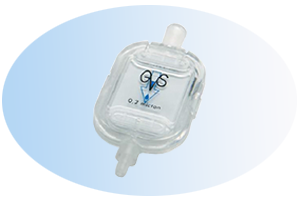Контрактное производство мембран OEM
GVS Filter Technology — полностью интегрированная компания-производитель и поставщик мембранных технологий для биологических наук, контроля окружающей среды и процессов, связанных с фильтрацией. Наши мембраны используются для лабораторных исследований, производства продуктов питания и напитков, медицинской диагностики, фармацевтических исследований и обработки биологических образцов. Все мембраны производятся на наших заводах в Северной Америке и Италии, что позволяет легко и недорого изготавливать их по индивидуальному заказу. GVS Filter Technology предлагает широчайший выбор мембран на рынке и, благодаря своему опыту, может стать вашим партнером и предоставить вам любые требуемые мембраны.
-
Наша история
-
Наши возможности
-
Наши обязательства
-
Наши качество и сертификаты

Мы к вашим услугам на каждом этапе. Если вам нужна более подробная информация, обращайтесь к нам без колебаний: gvsrussia@gvs.com
Руководство по применению полимерных мембран
Позвольте GVS Filter Technology стать вашим универсальным поставщиком любой продукции для фильтрации в рулонах. Как мировой лидер с широчайшим портфолио микропористых мембран, мы можем заменить целый перечень поставщиков. Наши сотрудники, являющиеся специалистами в науке, имеют опыт в разных отраслях промышленности и могут помочь в разных вопросах, в том числе касающихся промышленности, биологических процессов или лабораторных методик.
Полимерные гидрофильные мембраны
Тип мембраны |
Характеристики |
Применение |
Области |
АЦ |
Гидрофильные, с низким неспецифическим связыванием, низкой адсорбцией, термостабильные, одно-родная структура пор |
Фильтрация белков или ферментов, извлечение белков, фильтрация сред для культур тканей, фильтрация вина, предварительная фильтрация фракций плазмы и вакцин |
Лабораторная фильтрация; фильтрация проб из окружающей среды, напитков, исследование воды |
ПЭС |
Гидрофильные, с низким связыванием белка, высокой производительностью, асимметричная структура |
Фильтрация крупных частиц (крупные поры), окончательная фильтрация (мелкие поры), подготовка биологических проб, фильтры для в / в систем |
Экологический анализ и напитков, лабораторная фильтрация, Медицинские инфузионные системы |
ПЭС положительно заряженные |
Гидрофильные, с низким связыванием белка, высокой производительностью. |
Фильтры во в / в системах, введение он-ко- логических препаратов, долговременное введение |
Медицинские инфузионные системы |
ПЭС, не пропускающие воздух |
Гидрофильная мембрана, не про-пускающая воздух |
В / в капельные системы |
Медицинские инфузионные системы |
Нейлон |
Гидрофильные, с внутренним упрочнением, высокая площадь поверхности, высокое связывание белков, низкое содержание экстрагируемых веществ, упрочненные для использования с автоматическим оборудованием |
Подготовка проб для ВЭЖХ, осветление водных и органических растворов, щелочных растворов, обработка напитков и плазмы |
Лабораторная фильтрация, анализ, обработки биологических проб, фармацевтических препаратов; Экологический анализ и напитков |
Нейлоновая мембрана для фильтрации с положительным зарядом |
Более высокая связывающая способность, чем у НЦ, с внутренним упрочнением, выдерживает много-кратное зондирование, удерживает гидрофильные эндотоксины |
Системы обнаружения с радиоактивной меткой и без, нозерн- и саузернблоттинг (нуклеиновые кислоты), многократное зондирование, щелочной перенос, ДНК-дактилоскопия, образование перекрестных сшивок при УФ- облучении, фильтры во в / в системах |
Лаборатории — молекулярная биология и диагностика, Медицинские инфузионные системы |
НЦ |
Гидрофильные, устойчивы к слабым кислотам, углеводородам, формальдегиду и петролейным эфирам, высокое связывание белков |
Гравиметрия и осветление водных растворов; отделение и обнаружение микроорганизмов |
Лабораторная фильтрация; фильтрация проб из окружаю-щей среды, напитков, исследование воды |
ПВДФ Гидрофильное |
Высокая скорость фильтрации, низкое содержание экстрагируемых веществ, широкая химическая совместимость, очень низкое связывание белков |
Среды для культур тканей, фармацевтические компоненты, ВЭЖХ |
Фармакология, медицина |
Полимерные гидрофобные мембраны
Тип мембраны |
Характеристики |
Применение |
Области |
Мембраны для фильтрации из ПВДФ на подложке/без нее |
Гидрофобны по своей природе, чистые, высокая чувствительность, низкий фоновый сигнал, широкая химическая совместимость |
Обнаружение белков с помощью вестерн-блоттинга, анализ аминокислот, секвенирование белков, подготовка проб для ГХ |
Лаборатории — молекулярная биология и диагностика |
ПВДФ олеофобные |
Гидрофобны по своей природе, хорошо подходят для повторного использования |
Установка в воздушные / газовые отверстия, защита датчиков, всасывание / аспирация, медицинские устройства |
Медицина, фармацевтика, промышленность, производство пищи и напитков, установка в вентиляционные отверстия медицинского оборудования, автомобильная промышленность |






